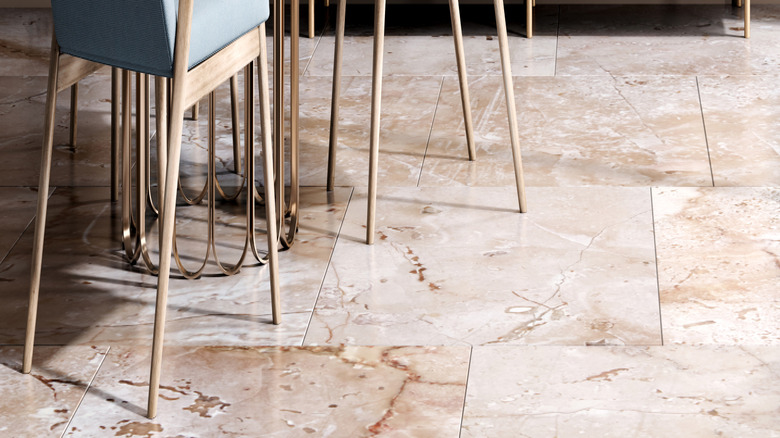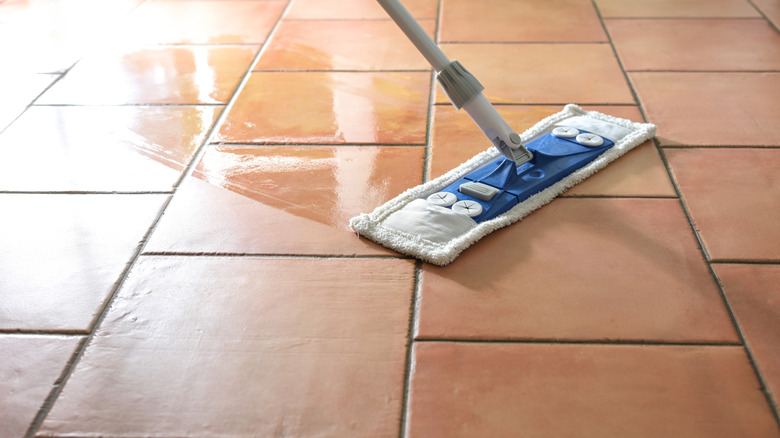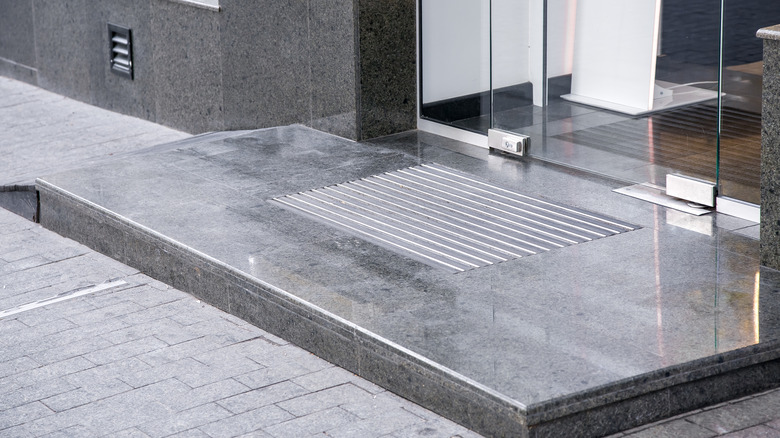Products And Cleaners That Are Safe For Stone Floors
We may receive a commission on purchases made from links.
Stone floors are always a beauty in your home. Aside from their uniqueness and the fact that they fit into almost every aesthetic, stone floors are also extremely durable and will increase your property value. But, one thing you need to know about stone floors is that they can also be tricky to maintain. There are a lot of common cleaning products that you should avoid using on your stone floors because the products could possibly damage them. To keep your stone floors safe, you should always opt for pH-neutral cleaners and microfiber mops for both dusting and mopping.
Acidic cleaners (pH below seven) will cause etching, which leaves a dull, whitish mark on your floors that is rough to the touch. Alkaline ones (pH above seven) will leave a residue that you'll need to neutralize to remove. To do that, you're going to need an acidic cleaner, which brings us back to the etching problem. Neutral cleaners are the safest for stone floors, and it's best to get the ones that actually say "safe for stone floors" on the label. The Granite Gold Daily Cleaner is a great available option. You can also consider a concentrate that will last long, such as Black Diamond Stoneworks Stone Cleaner. However, some reviewers complain that this product doesn't have a nice smell.
How to mop your stone floors and what to use
With these floors, dry or dust mopping is best for necessary daily cleaning. This is because stone scratches easily and dirt and dust can act as abrasives if you don't get rid ofthem. You will still need to wet mop, but once or twice a week is fine. Use as little water as possible, as these floors are naturally porous and will soak up any excess water or dirt. There are two ways that you can wet mop your stone floor. You could spray the neutral floor cleaner on the floor and let it sit for about a minute before mopping that area with a dry mop. For areas that tend to have stuck-on dirt or grime (like kitchens), pour some of the floor cleaner in a bucket of water, then put the mop in the water and wring it out well before mopping.
The best kind of mops to use for your stone floors, whether dry or wet mopping, are microfiber mops. They trap dirt a lot better than traditional cotton mops and don't need as much water. They are also easy to clean and much more durable than other traditional mops. Consider getting the Bona Premium Microfiber Floor Mop. It has different pads for both dry and wet mopping, making it quite cost-effective. You should probably also buy the 6-pack Microfiber Cleaning Pad that's designed for Bona mops so you can have replacement pads.
More ways to protect your stone floors
With stone floors, preventing cleaning issues is always better and less expensive than fixing them. Always have mats at your entrances to avoid tracking dirt from shoes onto your floors. The underside of the mat also needs to be non-slip to keep it in place. You also need to put pads under any metal parts that touch the floor, such as furniture legs and decor. This is to prevent any staining from rust that might be difficult to clean. While there are a lot of helpful tricks for getting rid of rust stains, a lot of them need acidic cleaners, which are a no-no for your floors.
Avoid placing your hot pots or pans on the floor. As much as stone floors are heat-resistant, it's safer to use trivets or mats instead of placing hot cookware directly on the floor. Also, coasters and placemats are a necessity if you ever feel like eating on the floor — acidic drinks like juices and coffee can etch your floor badly. If spills do happen, you should blot them out immediately with paper towels or a microfiber cloth, especially dark liquids. Otherwise, you stand the risk of letting your floor soak up the liquid and getting stained. Finally, if you ever have to vacuum your stone floor, try not to use cleaners with worn-out attachments that can scratch the floor's surface.


